Abstract
The ulcer healing and cytoprotective properties of colloidal bismuth (De-Nol) are well established although its mode of action is unclear. We have examined the action of bismuth subcitrate, the active ingredient of De-Nol, on gastroduodenal bicarbonate secretion by isolated amphibian mucosa. Addition of bismuth subcitrate (10(-6) to 10(-4) M) to the luminal solution produced a dose dependent increase in bicarbonate secretion from both gastric and duodenal mucosae without a change in transmucosal potential difference. The magnitude of this stimulation was greater for gastric than duodenal mucosae at all dose ranges. A second bismuth salt, bismuth oxynitrate, produced similar increases in bicarbonate secretion from gastric mucosae. Pretreatment of gastric mucosa with the cyclooxygenase inhibitor, indomethacin (10(-5) and 10(-4) M), did not abolish the secretory response to bismuth subcitrate. Similar treatment with the chloride transport inhibitor, 4-acetamido-4'-isothiocyanatostilbene-2,2'-disulfonic acid (SITS) (10(-3) M) prevented the secretory response to bismuth subcitrate.
Full text
PDF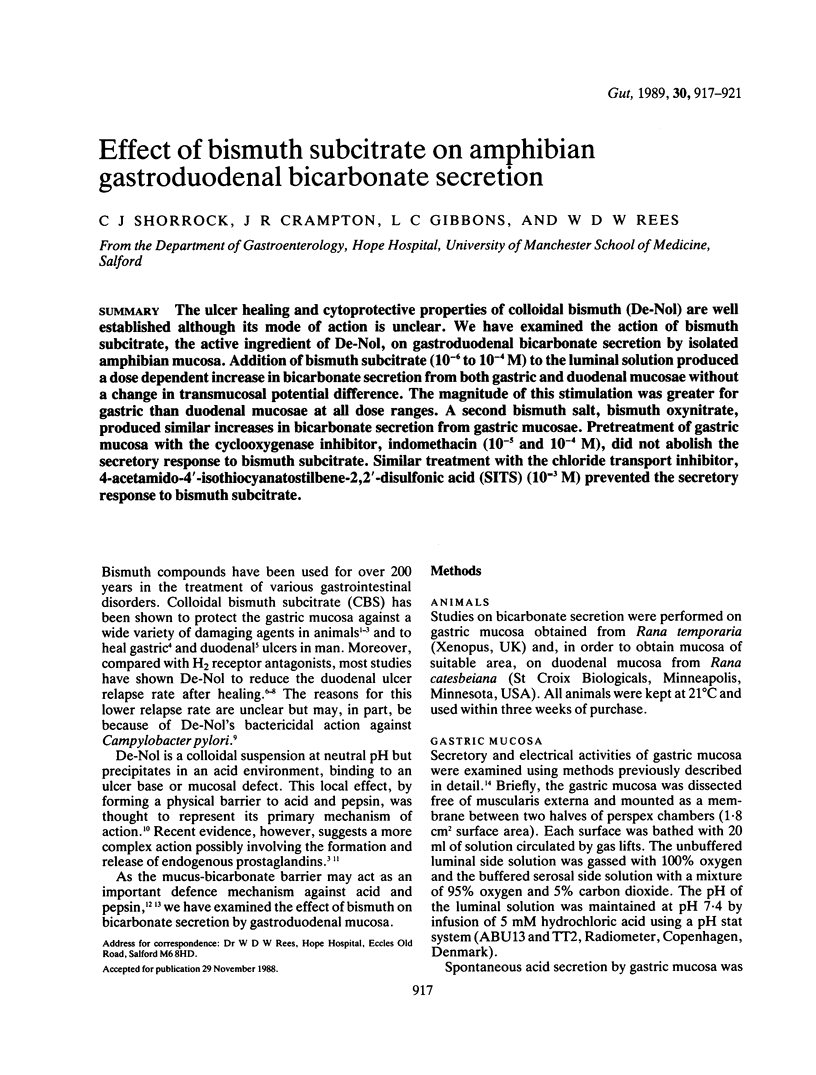
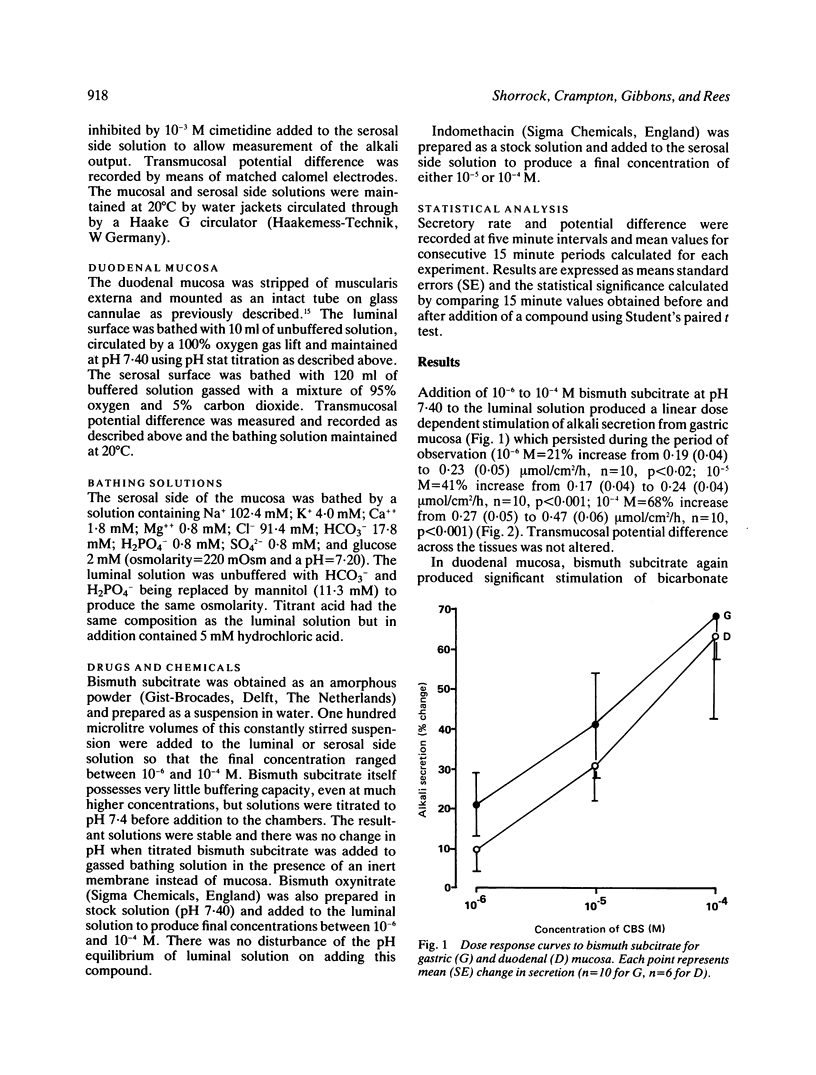
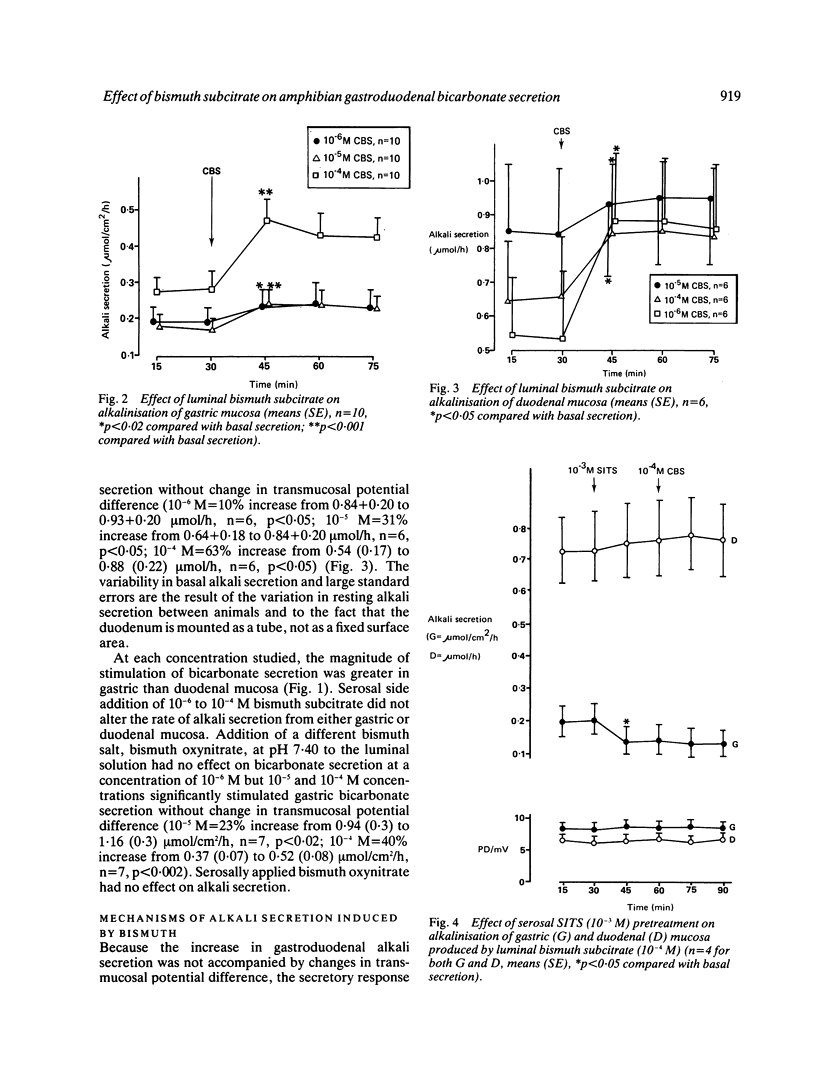
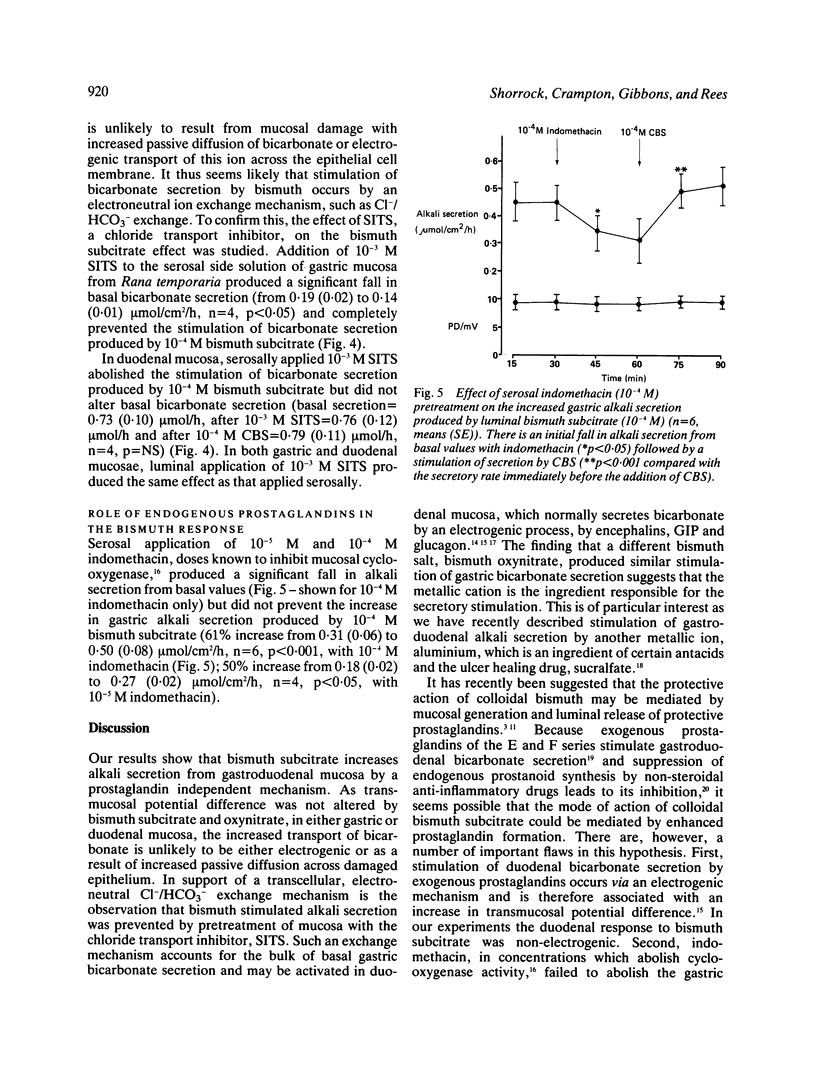
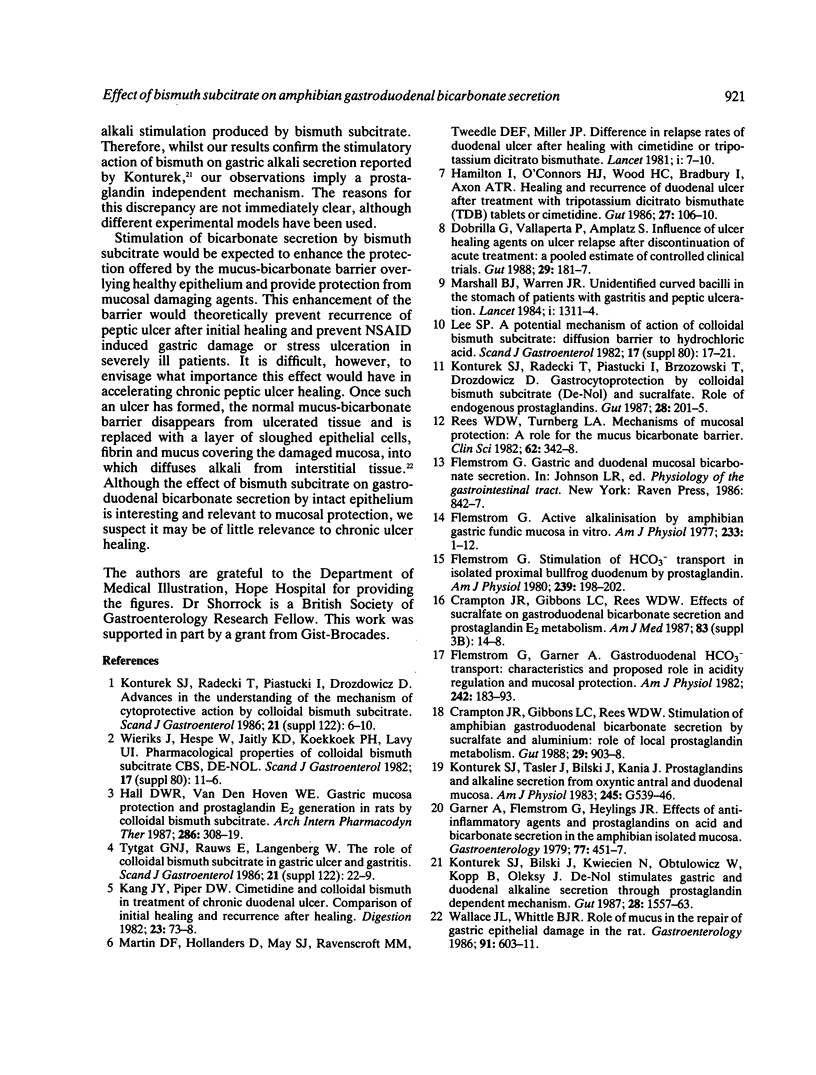
Selected References
These references are in PubMed. This may not be the complete list of references from this article.
- Crampton J. R., Gibbons L. C., Rees W. D. Stimulation of amphibian gastroduodenal bicarbonate secretion by sucralfate and aluminium: role of local prostaglandin metabolism. Gut. 1988 Jul;29(7):903–908. doi: 10.1136/gut.29.7.903. [DOI] [PMC free article] [PubMed] [Google Scholar]
- Crampton J. R., Gibbons L. C., Rees W. Effects of sucralfate on gastroduodenal bicarbonate secretion and prostaglandin E2 metabolism. Am J Med. 1987 Sep 28;83(3B):14–18. doi: 10.1016/0002-9343(87)90821-7. [DOI] [PubMed] [Google Scholar]
- Dobrilla G., Vallaperta P., Amplatz S. Influence of ulcer healing agents on ulcer relapse after discontinuation of acute treatment: a pooled estimate of controlled clinical trials. Gut. 1988 Feb;29(2):181–187. doi: 10.1136/gut.29.2.181. [DOI] [PMC free article] [PubMed] [Google Scholar]
- Flemström G. Active alkalinization by amphibian gastric fundic mucosa in vitro. Am J Physiol. 1977 Jul;233(1):E1–12. doi: 10.1152/ajpendo.1977.233.1.E1. [DOI] [PubMed] [Google Scholar]
- Garner A., Flemström G., Heylings J. R. Effects of antiinflammatory agents and prostaglandins on acid and bicarbonate secretions in the amphibian-isolated gastric mucosa. Gastroenterology. 1979 Sep;77(3):451–457. [PubMed] [Google Scholar]
- Hall D. W., van den Hoven W. E. Gastric mucosa protection and prostaglandin E2 generation in rats by colloidal bismuth subcitrate (DE-NOL). Arch Int Pharmacodyn Ther. 1987 Apr;286(2):308–319. [PubMed] [Google Scholar]
- Hamilton I., O'Connor H. J., Wood N. C., Bradbury I., Axon A. T. Healing and recurrence of duodenal ulcer after treatment with tripotassium dicitrato bismuthate (TDB) tablets or cimetidine. Gut. 1986 Jan;27(1):106–110. doi: 10.1136/gut.27.1.106. [DOI] [PMC free article] [PubMed] [Google Scholar]
- Kang J. Y., Piper D. W. Cimetidine and colloidal bismuth in treatment of chronic duodenal ulcer. Comparison of initial healing and recurrence after healing. Digestion. 1982;23(2):73–79. doi: 10.1159/000198690. [DOI] [PubMed] [Google Scholar]
- Konturek S. J., Bilski J., Kwiecien N., Obtuløwicz W., Kopp B., Oleksy J. De-Nol stimulates gastric and duodenal alkaline secretion through prostaglandin dependent mechanism. Gut. 1987 Dec;28(12):1557–1563. doi: 10.1136/gut.28.12.1557. [DOI] [PMC free article] [PubMed] [Google Scholar]
- Konturek S. J., Radecki T., Piastucki I., Brzozowski T., Drozdowicz D. Gastrocytoprotection by colloidal bismuth subcitrate (De-Nol) and sucralfate. Role of endogenous prostaglandins. Gut. 1987 Feb;28(2):201–205. doi: 10.1136/gut.28.2.201. [DOI] [PMC free article] [PubMed] [Google Scholar]
- Konturek S. J., Radecki T., Piastucki I., Drozdowicz D. Advances in the understanding of the mechanism of cytoprotective action by colloidal bismuth subcitrate. Scand J Gastroenterol Suppl. 1986;122:6–10. doi: 10.3109/00365528609102578. [DOI] [PubMed] [Google Scholar]
- Konturek S. J., Tasler J., Bilski J., Kania J. Prostaglandins and alkaline secretion from oxyntic, antral, and duodenal mucosa of the dog. Am J Physiol. 1983 Oct;245(4):G539–G546. doi: 10.1152/ajpgi.1983.245.4.G539. [DOI] [PubMed] [Google Scholar]
- Lee S. P. A potential mechanism of action of colloidal bismuth subcitrate: diffusion barrier to hydrochloric acid. Scand J Gastroenterol Suppl. 1982;80:17–21. [PubMed] [Google Scholar]
- Marshall B. J., Warren J. R. Unidentified curved bacilli in the stomach of patients with gastritis and peptic ulceration. Lancet. 1984 Jun 16;1(8390):1311–1315. doi: 10.1016/s0140-6736(84)91816-6. [DOI] [PubMed] [Google Scholar]
- Martin D. F., Hollanders D., May S. J., Ravenscroft M. M., Tweedle D. E., Miller J. P. Difference in relapse rates of duodenal ulcer after healing with cimetidine or tripotassium dicitrato bismuthate. Lancet. 1981 Jan 3;1(8210):7–10. doi: 10.1016/s0140-6736(81)90114-8. [DOI] [PubMed] [Google Scholar]
- Tytgat G. N., Rauws E., Langenberg W. The role of colloidal bismuth subcitrate in gastric ulcer and gastritis. Scand J Gastroenterol Suppl. 1986;122:22–29. doi: 10.3109/00365528609102582. [DOI] [PubMed] [Google Scholar]
- Wallace J. L., Whittle B. J. Role of mucus in the repair of gastric epithelial damage in the rat. Inhibition of epithelial recovery by mucolytic agents. Gastroenterology. 1986 Sep;91(3):603–611. doi: 10.1016/0016-5085(86)90629-3. [DOI] [PubMed] [Google Scholar]
- Wieriks J., Hespe W., Jaitly K. D., Koekkoek P. H., Lavy U. Pharmacological properties of colloidal bismuth subcitrate (CBS, DE-NOL). Scand J Gastroenterol Suppl. 1982;80:11–16. [PubMed] [Google Scholar]


